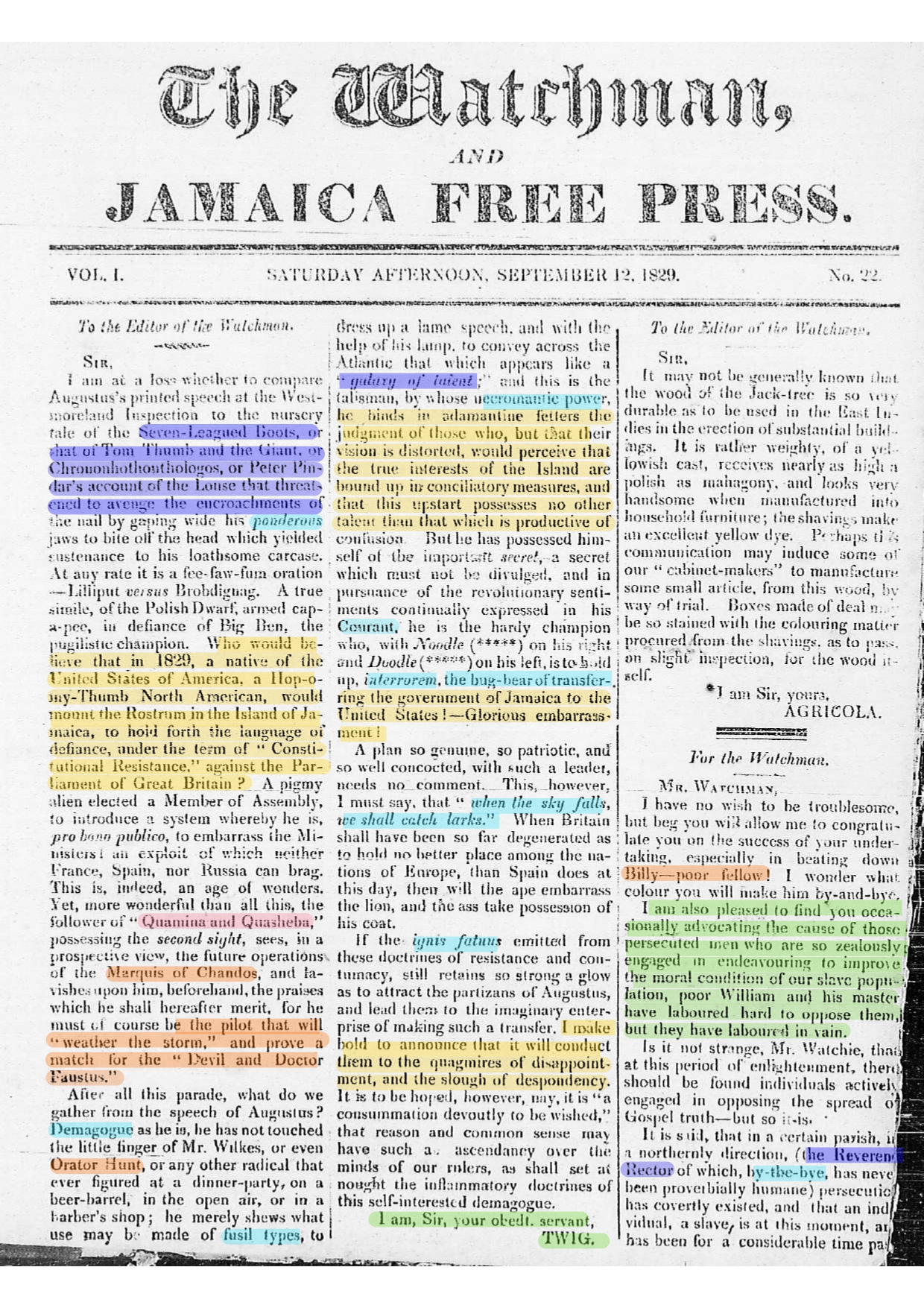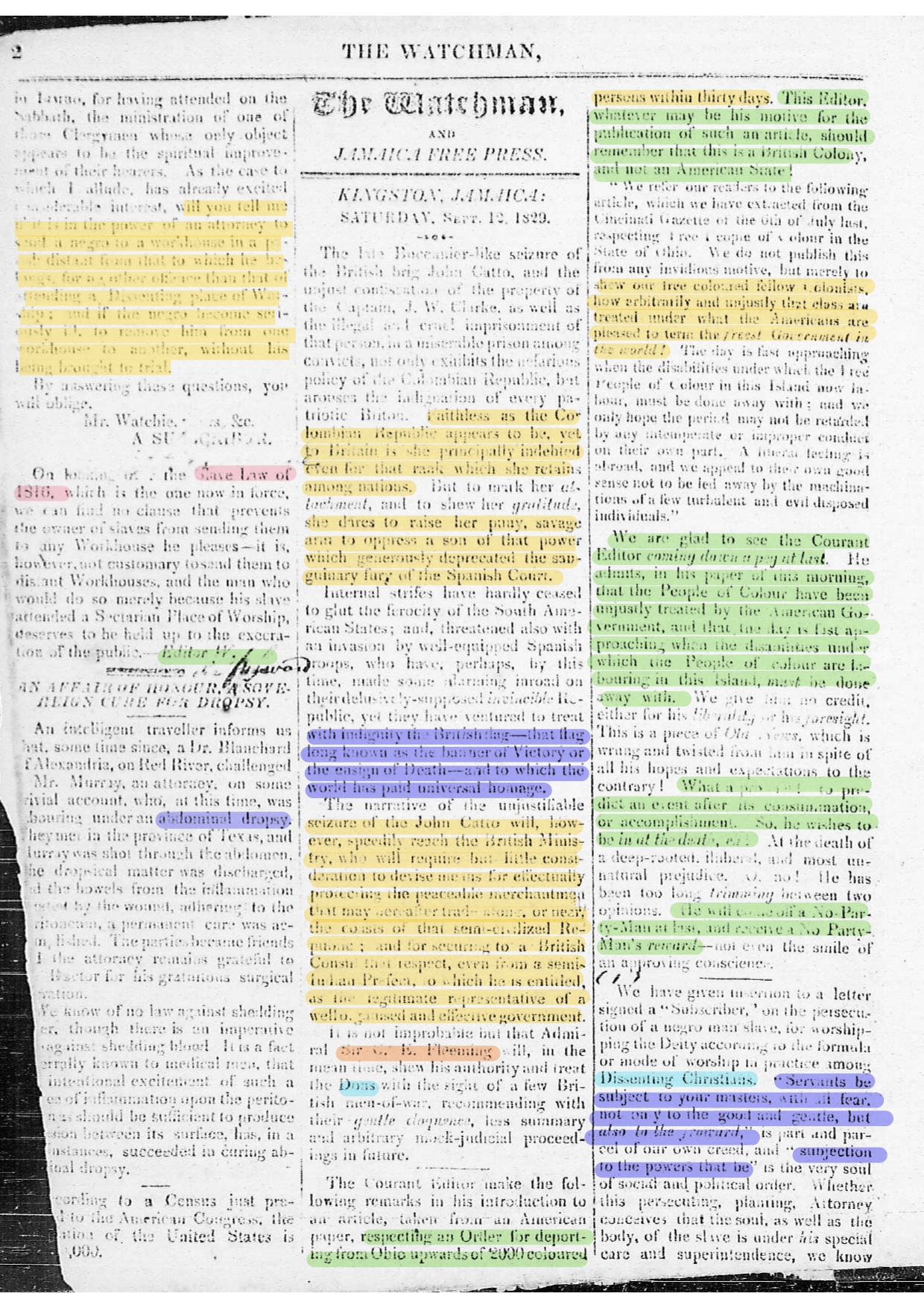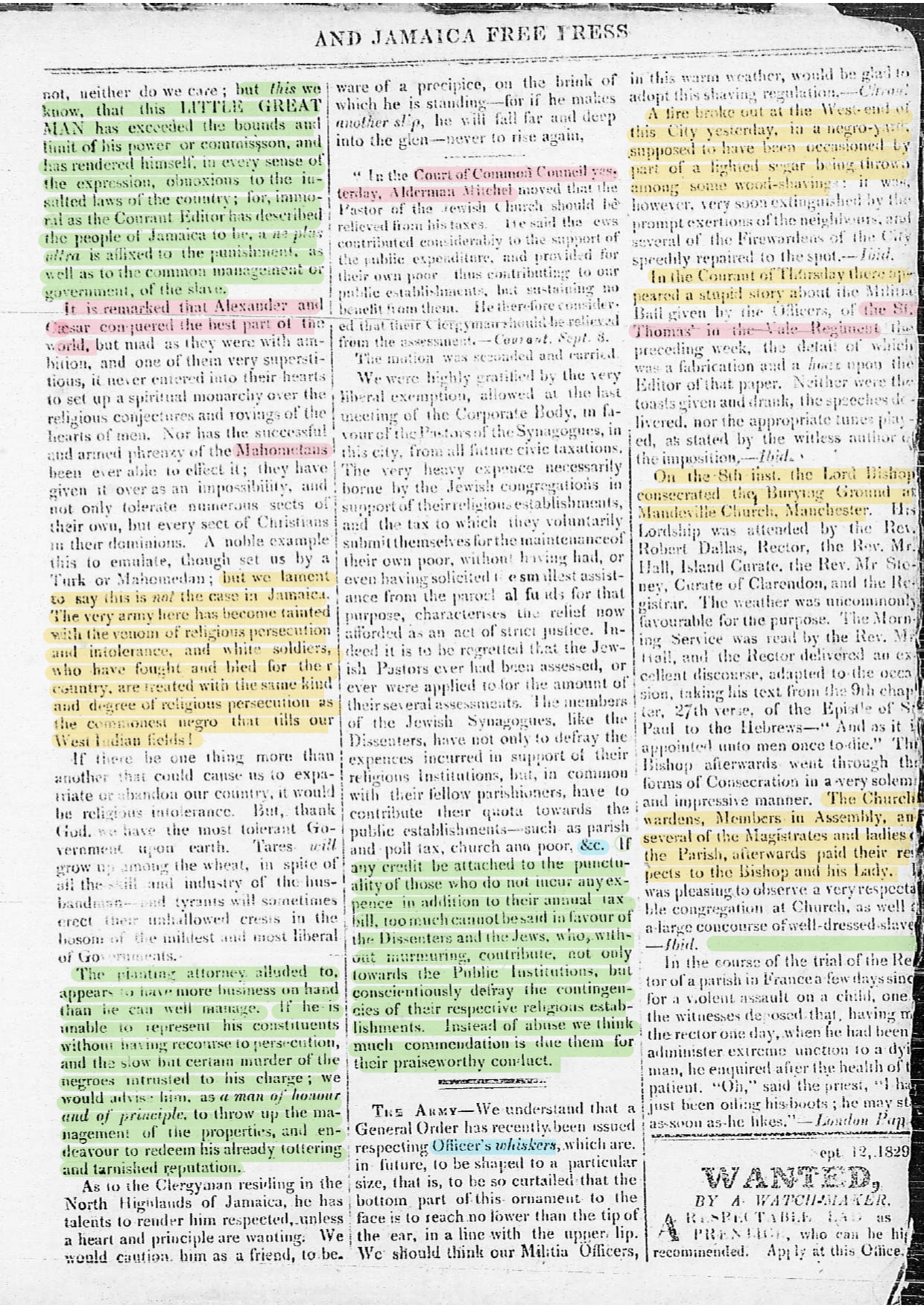Legend
Dark Blue: Cultural References
Light Blue: Vocabulary Definitions
Orange: Descriptions of People and Figures
Pink: Descriptions of Historical Places & Times (Places/Settings/Events)
Yellow: Content Description/Important Connections
Green: Watchman Specifics

Seven-Leagued Boots is a reference to European folklore that states when someone wears these particular books, they take large strides and are able to move quickly. Thus the writer could be stating "Augustus' printed speech" was fast paced.1
Tom Thumb and the Gaint was the first printed English fairy tale and followed Tom, who had mythical powers, journey through adventures.2
Chrouonhothonthologos, or rather Chrononhotonthologos, is an English Restoration and Augustan heroic tragedy created by Henry Carey in 1734 and is credited as a "flamboyant exaggeration." This reference alludes to the fact that Augustus' speech was dramatic.3
Peter Pindar, or rather John Wolcot, was a comedic poet who focused on court life and the royal family. He frequently mentions insects in his work. In 1767 he accompanied the new Governor of Jamaica (Sir William Trelawney) and became the Physician-General. He returned home to England in order to be ordained by the Bishop of London and then ventured back to Jamaica as a clergyman. He was a very "unclerical cleric."4
Definition: Clumsy because of a heavy weight or large object.
The writer is shocked that in 1829 (which is similar to the present expression "its 20XX..." or "get with the times") that someone from the Americans (U.S.A in particular) would raise the Rostrum (raising a platform of speech and/or a podium) in Jamaica to promote their defiant views, which is encouraged by "Constitutional Resistance" (Abraham Lincoln refers to this as a principle where the people who established the Constitution should have the final say in its meaning).5 - what these views are may be noted later in the text.
In Mimi Sheller's writes that, "revealing in the prevalent colonial stereotype of the noisy and aggressive slave woman 'Quasheba,' generations of black women reenacted and sustained their own community's empowering leadership personae, whether as African Grandmother, Jamaican Mother, Afro-Creole Queen-Mother, Revival Queen, Church Mother, or Queen of the Rebels." For further reading on Sheller's usage of the term "Quasheba," read: Quasheba, Mother, Queen: Black Women's Public Leadership and Political Protest in Postemancipation Jamaica.6
Quasheba is also a female name, meaning "born on Sunday." Quasheba is unique to America while "Kwasi" was used in West Africa. The name was used among enslaved people.7
Quamina Gladstone (1778-1823) was a Guyanese enslaved person. He took part in the Demerara rebellion of 1823 where he was killed by British soldiers. He is revered by many enslaved peoples.8
Richard Plantagenet Emple-Nugent-Brydges-Chandos-Grenville was the 2nd Duke of Buckingham and Chandos and between 1822 and 1839 he was Marquess of Chandos.9
The follower of "Quamina and Quasheba," possess the ability to see the future operations of the Marquis of Chandos. This follower praises him as he must control a storm and prove he is an equal match to the "Devil and Doctor Faustus." (an Elizabethan tragedy by Christopher Marlowe. In the play, the character, Dr. Faustus asks the Devil for magical powers. The Devil gives Faustus what he desires but only for a limited time. Once that time is up the Devil gets to claim Faustus' soul and forever enslave him.) .10
Demagogue refers to a leader that appeals to its people's desires and prejudices to exploit and agitate.
Orator Hunt was a British radical speaker and agitator and is remembered as a pioneer of working-class radicalism. He was an important influential figure for the Chartist movement and he advocated parliamentary reform and repeal of the Corn Laws.
Member of parliament of the UK (1830-1833)
Full name: Henry Hunt 1773-1835
Types of guns. Fusil is French.
The writer refers to the Atlantic as a vast space of opportunity, or intent.
A magical ability that allows someone to communicate with the dead. The deceased spirit is conjured through visions. Divination and predicting the future are often involved.
The writer exclaims that Augustus' speech conveys/is advised across the Atlantic. He has a necromantic power that binds, in unbreakable bindings, anyone who perceives Jamaica's measures of interest as appeasing or pacifistic. The writer views this as a distorted vision of confusion.
Courant is French for Current. In this instance, Courant could allude to current new or current expression of news.
In terrorem: is Latin for into/about Fear or intimidation.11
Generally this phrase means that one needs to be rational about certain circumstances. Way Word Radio states that this phrase means that it is pointless to worry about things out of ones control, the outcome wont change with worrying.12
Something foolish or misleading.13
Ignis: Fire
Fatuus: Foolish
The writer notes that the deceptive foolishness emitted from these doctrines of resistance attacks the Partizans of Augustus, and leads them to an imaginary enterprise that will only cause disappointment. The writer devoutly wishes that the rulers will gain reason and common sense, as the writer will not promote a doctrine of self-interest demagogue.
The writer is the Watchman's obedient servant. - Much like Christian phrases of obedience to God or obedience to a slave owner.
Many people when writing to the watchman would use code names to hide their identity. This allowed for women, free people of color, and abolitionist to write, express their opinions, and report the happenings of the island anonymously.
Since the Watchmen was an abolitionist newspaper founded on a campaign for the civil rights of free peoples of color, which also fought for the abolition of slavery, its frequent reports on the details and events happening on the Island allowed peoples of color to stay informed on the activities of planters and enslavers. This was only made possible through the paper's confrontational writing, tone, and purpose.14 Thus it is not surprising that the Watchman editors would advocate for the persecuted men who tired to improve the conditions of slavery. It is difficult to discern who William is, however based on the fact that he and his master (who benefited from slavery) labored to oppose them, may indicate that they were fighting against these anti-slavery advocates.
The respect for clergy or the Church.
By the by can mean Incidentally.

A Workhouse, also known as a Sugar House, was a site of punishment that epitomized the brutality of enslaved peoples, and for a time, also free peoples of color.19 Punishment in these Workhouses was in the form of whippings, padding, and a treadmill. After those being punished were locked away in small suffocating cells. Enslavers would send their enslaved to workhouses as a form of punishment and often did not have to provide a reason. Enslaved people would also be sent to Workhouses as they awaited to be transferred to another plantation, state, or enslaver. The workhouses also concealed and stopped runaways. In the 1820s, Workhouses seemed to be an essential part of the system of slavery, especially in its ability to enable fear and obedience.20
Considering how much control the Workhouse had and the little regulations it contained early on, it seems unlikely an attorney would be able to help an enslaved person get out of a Workhouse as punishment, especially if their main argument was illness.
The Barbados Rebellion, also known as the Bussa Rebellion, took place on April 14th, 1816 and is known as one of the first and largest slave rebellions. The colonial militia was sent to defeat the rebellion as its mass alarmed slave holders and governments. Thus "the Slave Law of 1816" could refer to a new law that stricken planter's and slaver's hold on their slaves, or it could refer to an updated law that was previous enforced. Either way, any regulations on plantation and the institution of slavery was affected by the Barbados Rebellion.17
For further reading on the Barbados Rebellion and other slave Rebellions, read: Hilary McD. Beckles' "The Slave-Drivers' War: Bussa And The 1816 Barbados Slave Rebellion."
The Editors of the Watchman are responding to the Subscriber's question on Workhouses above.
Abdominal dropsy is the swelling in the abdomen/lower stomach with an excess of fluid.
Though the Colombian Republic is disloyal, it is still indebted to Britain even at its national rank.
Instead of showing loyalty, the Colombian Republic oppresses "a son" who expressed disapproval of the bloodshed caused by the Spanish Court.
The Southern American States are threatened by a well-equipped Spanish invasion. They have ventured to treat the British dag with indignity (the British banner of Victory or the ensign of Death) which the rest of the world is also indignant to.
The seizer of the John Catto, what appears to be a British ship, will reach the British Ministry and they will devise a plan to allow the "peaceable merchantmen" to trade and near coasts of "that semi-civilized Republic." - this semi-civilized Republic refers to the Colombian Republic as they seized the ship.
Admiral Sir Charles Elphinstone Fleeming (1774-1840) served during both the French Revolution and the Napoleonic wars as a British Royal Navy officer. He was commander-in-chief of the West Indies for a year in 1828. He was also a Member of Parliament.18
A Spanish Gentleman.
Oberlin College was founded in 1833 by John Shipherd and Philo Stewart and was inspired by Pastor John Frederick Oberlin. The University was founded on the line of anti-slavery principles and social reform. They accepted any student regardless of race or sex and guaranteed freedom of speech. This was very radical for its time.
A group of students, The Lane Rebels, at Lane Seminary often debated and discussed about the abolition movement and were strongly opposed to the American Colonization Society. Since these conversations on abolition were rejected by their institution, The Lane Rebels decided to transferred to Oberlin College. As much as the Lane Rebels needed a space to freely converse and learn, Oberlin was going through a financial crisis and needed the Lane Rebels to strengthen their student body.
Eventually, Oberlin became a safe place for runaway enslaved people and peoples of color to live and learn.19
Though this deportation may have limited connection to Oberlin, as this newspaper is dated in 1829 and Oberlin was not founded until 1833, it is still relevant to reference this important connection.
What should be noted is that the editor refers to the persons being deported as "coloured persons" instead of enslaved people.
This American article that the Courant Editor protests about is written towards "free coloured fellow colonists" and demonstrates the unjustness of the classes within the Americas, a country that is supposed to be the freest in the world.
The article predicts that soon the oppressive restrictions imposed on free peoples of color in Jamacia will soon be extinguished.
The Courant Editor hope this good sense will not be consumed by "evil disposed individuals."
The Watchman editors praise the Courant Editor for acknowledging the unjust treatment peoples of color have endured from the American Government. Both the Watchman and the Courant predict that freedom is fast approaching, however the Watchman demonstrates that this goal is not new and is one that their paper strives to achieve through many of their newspaper articles.
The Watchman editors illustrate that many media platforms such as the Courant Editor's newspaper has probably publish false allegations and pro-slavery comments in the past. However, now (in 1829) that abolition is increasingly becoming possible and the abolitionist movement grows, these newspapers switch interests in order to be viewed in a better light by the media. This is most evident when the Watchman Editors comment, "to predict an event after its consummation or accomplishment." When the Watchman notes that the Courant shifts between two opinions, this could indicate that many newspapers need to be able to shift between public opinions quickly. Or this could allude to the fact that the Courant is unsure of its political position.
A term to describe Protestant groups who have little in common except for their refusal to conform to the Church of England. They rather create their own establishments rather then have the state or church interfere with their religion.20
The Subscriber writes that servants must conform and obey their masters, both the good and gentle and the difficult (Froward).

Though the Watchman editors do not know whether this Subscriber believes that the soul and body of enslaved peoples are under enslaver's care, they do know that the Subscriber, a LITTLE GREAT MAN (an insult), has over stepped the limits of their power and thus has rendered themselves obnoxious to the country's laws.
Though this Subscriber immorally describes the people of Jamaica, they do describe common punishment and governing protocols inflicted within the institution of slavery.
Alexander the Great (356BCE-232BCE) ruled the Kingdom of Macedon and created one of the largest empires in history that expanded from Greece to northwestern India.
Julius Caesar (100BCE-44BCE) was a roman general and statesman that transformed the Roman Republic and created much social reform. He was pivotal in the rise of the Roman Empire.
The Watchman make reference to Alexander the Great and Julius Caesar, who were two conquerors that never used spiritual monarchy or religious conjectures to control their armies or people. For example, they did not tell their warriors to fight for their countries through the usage of religion. Neither have the Mahometans. However this is not the same for Jamaica. Jamaica's intolerance of religion has tainted the souls of its army.
Now, white soldiers who have fought for Jamaica are being treated with degeneration in a similar manner to how white people in the Americas treated the enslaved.
The Watchman editors confront the subscriber/attorney on their derogatory claims towards enslaved peoples and advises them to redeem their tarnished reputation and uphold their honor and principle -- characteristics someone in the legal profession should contain. The Watchman editor's are able to confront the subscriber and hold them accountable for their derogatory comments, which demonstrates their usage of discourse within their newspaper, in order to persuade anti-slavery ideals to their readers.
The Court of Common Council is the city of London's main decision-making body. The first council was elected in 1273.
&c means et cetera (etc)
The Watchman reports on additional legal situations such as the Court of Common Council's decision to alleviate the Pastor of the Jewish Church's taxes. The Watchman editors praise the contributions and conducts that the members of the Jewish Synagogues have given.
Whiskers is defined as someone's facial hair, or more specifically, beard. In the Watchman's context, a new regulation to maintain ones facial hair in a particular and orderly manner is established within the Army.
The main units of government in Jamaica are organized into Parishes. The Saint Thomas in the Vale Parish was located in Middlesex County. After 1866 it merged with the Saint Catherine Parish. Since 1867 there has been 14 parishes across Cornwall, Middlesex, and Surrey.21 The Saint Thomas in the Vale Parish Regiment could have been a military Regiment that originated in the Vale Parish but most likely expanded and combined with other Regiments after The Saint Thomas in the Vale Parish merged.
The Watchman uses this page (mostly in the last two columns) to briefly report on the news in Jamaica. The editors report on new regulations to maintain Officer's whiskers in the Militia, then they report about a fire and the communal effort to put it out, they write about a "stupid story" regarding the Militia Ball, and they report on the recent consecration of the Burying Ground at Mandeville Church, Manchester. Considering the Watchman editors report on multiple topics, their readers would have been exposed to a variety of subjects and perspectives, which demonstrates that the Watchman does not limit the news it reports on.
Endnotes
- Charles Perrault, “Hop-o’-my-Thumb,” Old French Fairy Tales, Boston: Little, Brown, and Company (1899), 342-358.
- J. O. Halliwell, “The Metrical History of Tom Thumb the Little,” Chiswick Press (1860).
- Peter Elfed Lewis, “Henry Carey’s ‘Chrononhotonthologos.’” The Yearbook of English Studies (1974), 130, https://doi.org/10.2307/3506688.
- Harry B. Weiss, “Peter Pindar and the Entomology of His Poems.” Journal of the New York Entomological Society 34 (1926), 232. http://www.jstor.org/stable/25004138.
- David F. Forte, and Charles R. Kesler, and David K. Nichols, “Constitutional Resistance,” Claremont Review of Books (2006), https://claremontreviewofbooks.com/constitutional-resistance/.
- Mimi Sheller, “Quasheba, Mother, Queen: Black Women’s Public Leadership and Political Protest in Postemancipation Jamaica.” Department of Sociology (2003), https://www.lancaster.ac.uk/fass/resources/sociology-online-papers/papers/sheller-quasheba-mother-queen.pdf.
- “Quasheba Definition and Meaning.” Collins English Dictionary, 2019. https://www.collinsdictionary.com/dictionary/english/quasheba.
- Richard B. Sheridan, “THE CONDITION OF THE SLAVES ON THE SUGAR PLANTATIONS OF SIR JOHN GLADSTONE IN THE COLONY OF DEMERARA, 1812-49,” NWIG: New West Indian Guide / Nieuwe West-Indische Gids 76, no. 3/4 (2002): 243–69. http://www.jstor.org/stable/41850197.
- David Spring, and Eileen Spring, “The Fall of the Grenvilles, 1844-1848,” Huntington Library Quarterly 19, no. 2 (1956): 165, https://doi.org/10.2307/3816224.
- Christopher Marlowe, “Doctor Faustus. Dover Thrift Editions,” Mineola, NY: Dover Publications (1995).
- “In Terrorem Definition & Meaning.” Merriam-Webster. Accessed November 27, 2023. https://www.merriam-webster.com/legal/in%20terrorem.
- Grant Barrett, “‘When the Sky Falls…’ Proverb,” A Way with Words (2021). https://www.waywordradio.org/when-the-sky-falls/.
- “Ignis Fatuus.” Oxford Reference. Accessed November 27, 2023. https://www.oxfordreference.com/display/10.1093/oi/authority.20110803095957220#:~:text=A%20will%2Do’%2Dthe,because%20of%20its%20erratic%20movement.
- Josh Lauer and Kenneth Lipartito, “Enslaved Watchmen: Surveillance and Sousveillance in Jamaica and the British Atlantic World,” ProQuest, (2021) 39. https://ebookcentral.proquest.com/lib/dtl/home.action.
- Jeff Strickland, “The Slave Workhouse,” In All for Liberty, Cambridge University Press (2021): 30, https://doi.org/10.1017/9781108592345.003.
- Strickland, “The Slave Workhouse,” 24–26,
- Hilary Beckles, “The Slaver-Drivers’ War: Bussa and The 1816 Barbados Slave Rebellion,” Boletín de Estudios Latinoamericanos y Del Caribe (1985), 85–110, http://www.jstor.org/stable/25675274.
- R. G. Thorne, “ELPHINSTONE FLEEMING, Hon. Charles (1774-1840), of Cumbernauld and Biggar, Stirling,” The History of Parliament: the House of Commons 1790-1820 (1986), https://www.historyofparliamentonline.org/volume/1790-1820/member/elphinstone-fleeming-hon-charles-1774-1840.
- Oberlin College Libraries, “The Lane Rebels and Early Anti-Slavery at Oberlin,” The Oberlin Sanctuary Project (2020). https://scalar.oberlincollegelibrary.org/sanctuary/the-lane-rebels.
- “Protestant Dissent,” The Queen Mary Centre for Religion and Literature in English, https://www.qmul.ac.uk/sed/religionandliterature/dissenting-academies/historical-information/protestant-dissent/
- G. E. Cumper, “Population Movements in Jamaica, 1830-1950,” Social and Economic Studies 5, no. 3 (1956): 261–80, http://www.jstor.org/stable/27851071.
